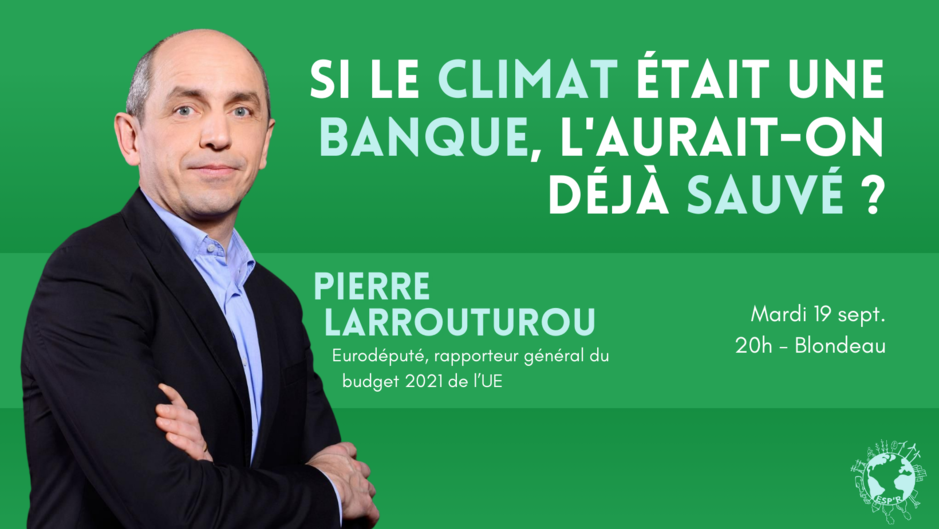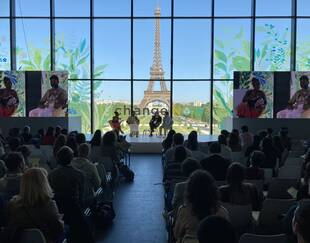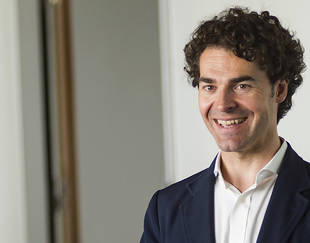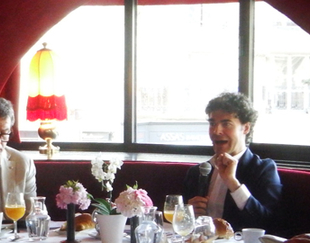"If the climate were a bank, would we have saved it by now?" Pierre Larrouturou presents his vision of the green economy at HEC Paris
On Tuesday September 20, 2023, the ESP'R student association welcomed Member of the European Parlament Pierre Larrouturou at HEC Paris for a conference on the climate emergency and its social consequences, entitled "If the climate were a bank, would we have saved it by now?". Participants had the opportunity to learn about the evolution of European environmental and economic policy, and to exchange views with an expert who worked in consulting before embarking on a career in politics, before becoming a leading figure in climate activism.

Auteur/Author of this article: Frédéric Voirin
"Ecological and social issues can be approached in two ways, which feed into and complement each other: through theory and practice". With these words, Hortense Franchon, president of ESP'R, invites the hundred or so students present to take their seats in the Blondeau amphitheatre at HEC Paris this Tuesday evening. For its first back-to-school conference, Esp'R - the HEC Paris student association focusing on eco-responsibility and environmental issues - has chosen the practical angle, with a leading figure in political commitment to the climate just a few months ahead of the European elections in June 2024.
This event is part of the ongoing reorientation of HEC Paris courses in favor of the ecological transition, civic engagement and major societal challenges.
WATCH THE CONFERENCE REPLAY (in french) :
« I didn't come here to lecture a conference but to find allies for the climate »
In front of a hundred or so HEC students, Hortense Franchon, President of the ESP'R student association, gives a 3-minute introduction to Pierre Larroutourou's background and early career.
Member of the European Parliament since 2019, Pierre Larrouturou trained as an agricultural engineer, is a graduate of Sciences Po, and has recognized expertise in economics. After his studies, he worked in consulting at Accenture for 11 years. He remained there until 2000, when he decided to devote himself entirely to his political commitments. After switching back and forth between the Socialist Party and Europe Écologie les Verts, he set up his own party, Nouvelle Donne, in 2013. A fervent environmental activist, in 2017 he founded the Climate Finance Pact, a collective fighting global warming on a European scale. And since 2019, he has been a Member of the European Parliament, and was general rapporteur for the EU's 2021 budget.
After these initial introductions, Pierre Larrouturou quickly got to the heart of the matter with a very detailed 15-minute Powerpoint presentation on the climate emergency and its consequences in terms of social urgency and economic impact. Above all, he makes it clear from the outset: "I didn't come here to give a lecture, but to find allies for the climate".
The MEP knows that at HEC Paris, not only the people in the Sustainability and Social Innovation Master's program, but also many students in the Grande Ecole Master in Management program are sensitive to environmental issues, especially since the redesign of the HEC Paris curriculum has shifted the focus to the ecological transition, civic engagement and global and societal issues.
Accelerating climate change and extreme phenomena force us to act
On this Tuesday evening at HEC Paris, Pierre Larrouturou hammered home with conviction and a lively tone that he "believes that citizens must make a stronger commitment to the planet".
He gives simple examples and precise economic statistics. Returning to his own experience, he points out that, although the phenomenon of hurricanes is not directly linked to global warming, their violence is its corollary: "Category 4 or 5 hurricanes have increased everywhere on the planet with recent global warming". On a more trivial note, he smiles a little ruefully when he says that "it used to rain all the time at my grandmother's house in Brittany. Now, there are fires", in front of a photo of a burning Ker breton (typical stone-made house of Brittany).
This native of Béarn explains that, on a personal level, he has changed his eating habits by reducing his consumption, particularly of meat, and no longer flies on vacation because there are too many concrete consequences of global warming on our economies. "The 2016 wheat harvest in Europe fell by a third: this -30% is a direct consequence of the floods that have rotted the crops."
"Citizens must make a stronger commitment to the planet".
Taxing financial transactions at 0.1% would provide 57 billion a year for the climate
In front of a very attentive student audience, the MEP set out his ideas for mitigating the consequences of climate change, with proposals for concrete measures, particularly in the world of finance.
"I think that if the climate were a bank, we'd already have saved it, because during the 2008 economic crisis, the European Central Bank was able to create 1,000 billion euros and resolve legal blockages in just 3 days", says Michel Rocard's former associate in the Socialist Party. He goes on to calculate that "today, we could have a central bank offering 300 billion euros in credit for the climate, for example, but post-covid, in the midst of inflation in 2023, with a tendency for political backtracking, it seems very complicated to invest against the climate emergency."
By way of comparison, in 2022, the share of investments by the European Investment Bank, which is increasingly oriented towards projects and actions for climate and environmental sustainability, reached "only" 36.5 billion euros.
So, if we want to facilitate carbon neutrality by 2050 in line with the Green Pact for Europe, the best solution, according to Pierre Larrouturou, would be a tax on financial transitions. Today, this strategic levy is non-existent, but he believes that financial activities could be taxed at a rate of 0.1%. According to his calculations, this would generate 57 billion euros each year to offset the economic consequences of the current climate impact.
"If the climate were a bank, we'd already have saved it".
The idea of a European Climate Bank, which has been taken up by the European Commission and is currently being implemented, is based on a global financing solution: the European Climate Finance Pact. The idea is to set up a Marshall Plan for the climate in Europe. The idea is to combine funds from the European Central Bank and global financial speculation, with the ultimate aim of draining an estimated 1,000 billion euros from the European Union's Court of Auditors.
Work 32 hours a week and create millions of jobs in the Green Economy
Pierre Larrouturou continues his suggestions for change with a proposal to change the pace of work to a 4-day week, i.e. 32 hours a week, originally suggested in 1993 by Antoine Riboud, CEO of the Danone group at the time. In his view, it would make sense to employ robots and machines, and thus rethink our lifestyles and production methods.
Moreover, after various more or less conclusive attempts in Europe between 2015 and 2019, the European Union has included in its 2023 budget a new pilot project proposed by Nouvelle Donne, which aims to improve employee well-being and productivity, and will notably give a voice to entrepreneurs who have made this choice. If successful, this project could lead to national legislation to modify working hours.
It would also enable the massive creation of new jobs in the green economy, estimated by the EIB at 500,000 new jobs by 2050 for the ecological transition alone, and several million more throughout Europe in new Green Economy sectors. What's more, this reduction in working hours could free up more time for employee training. According to the MEP, the combination of these new professions and parallel training needs "with a real finance-climate-employment pact, could create 900,000 jobs in France alone".
"With a real finance-climate-employment pact, we could create 900,000 jobs in France alone".
A militant consistency
The MEP is consistent in the ideas he defends: the 4-day week, more ambitious funding for the ecological transition, a Europe-wide tax on financial transactions, for which he went on hunger strike. Whether or not you agree with the ideas he defends, Pierre Larrouturou proposes concrete, ambitious solutions to the immense challenges of the 21st century, which encourage reflection and spur action.
His hunger strike left a lasting impression on the students in the amphitheatre that evening, many of whom changed their outlook on the man when they realized that he was the physical embodiment of his struggle. One of the students present asked a question at the end of the event about what the MEP thought of the current hunger strike by Thomas Brail, a tree defender who is campaigning in front of the Minister of Transport against the extension of the A-69 freeway on the Toulouse-Castres route. Pierre Larrouturou's response was immediate and to the point: "I'll go and support him tomorrow in Paris, I've promised".
With questions from students legitimately wondering whether a career in the business world is compatible with sustainable eco-responsibility, Pierre Larrouturou answered positively: "You can help bring about change in any type of company. I spent 11 years at Accenture with a boss specializing in change management. After that, I decided to fight my battles in politics, and I hope to be re-elected for another 4-year term as an MEP to pursue my actions."
"We can help bring about change in any type of company".
Related articles





